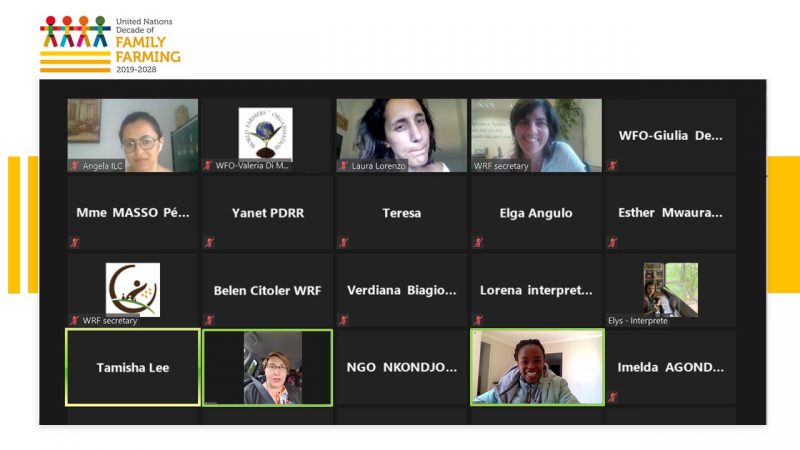On July 24th, an all-female delegation of the World Farmers’ Organisation (WFO) joined the virtual working meeting on “Roadmap on public policies for the empowerment of women and gender equality in family farming in the framework of the UN Decade of Family Farming”.
The event, hosted by the World Rural Forum (WRF), provided an excellent venue to share ideas on what national, regional and global family farmers’ organisations can do together to support the definition and implementation of strategies and public policies for the empowerment of women and then contribute to Pillar 3 of the Global Action Plan of the UN Decade of Family Farming (http://www.fao.org/3/ca4672en/ca4672en.pdf).
The WFO delegation taking part in the debate included: the facilitator of the WFO Women Committee, Kati Partanen, from Central Union of Agricultural Producers and Forest Owners (MTK) and its members, Dimakatso Sekhoto, from African Farmers Association of South Africa (AFASA), and Tamisha Lee, from Jamaica Network of Rural Women Producers (JNRWP).
Kati Partanen emphasised the importance of a holistic approach to achieving inspiring and constructive exchanges between farmers’ organisations to enhance women’s participation in the sector.
On challenges women face, Tamisha Lee identified access to technology as one of the most critical barriers that limit women’s opportunity to share their own experiences and ideas, especially now that due to COVID-19 pandemic the world has been going digital.
Dimakatso Sekhoto shined a light on all those women farmers who are contributing to a better agricultural sector through their leadership in farmers’ organisations.
The meeting also presented the results of the online survey launched last May by WRF in collaboration with FAO – Gender, to gather information about the policies that already exist on women and family farming, as well as highlight what women’s and family farming organisations are doing to improve the situation of rural women, generating well-being for the entire agricultural community.
Furthermore, the survey collected proposals for emerging measures to help farmers tackle the COVID-19 pandemic effects, which have had a devasting impact on family farming and in rural areas.
As a member of the UNDFF International Steering Committee, WFO was involved in the process since the beginning, contributing to the online survey and pointing out the importance of:
- Joining efforts among farmers’ organisations to enhance women’s participation in the sector, providing opportunities for women also to take leading positions among their organisations.
- Strengthening investments in social policies for families, as well as investing more on the multi-functionality of family farming through developing social services (i.e. kindergartens, social farming activities) where women play a very crucial role.
- Facilitating opportunities for exchange among family farmers, especially women, by creating dedicated networks/platforms.
Gender equality and women empowerment are crucial to accelerating the achievement of the Decade’s goals and progress on all Sustainable Development Goals. Agricultural policies and strategies must ensure that the critical role of women in food security, nutrition and sustainable development is recognised and addressed as an integral part of both short- and long-term responses.
